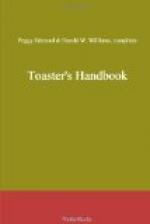PREFACE
Nothing so frightens a man as the announcement that he is expected to respond to a toast on some appallingly near-by occasion. All ideas he may ever have had on the subject melt away and like a drowning man he clutches furiously at the nearest solid object. This book is intended for such rescue purpose, buoyant and trustworthy but, it is to be hoped, not heavy.
Let the frightened toaster turn first to the key word of his topic in this dictionary alphabet of selections and perchance he may find toast, story, definition or verse that may felicitously introduce his remarks. Then as he proceeds to outline his talk and to put it into sentences, he may find under one of the many subject headings a bit which will happily and scintillatingly drive home the ideas he is unfolding.
While the larger part of the contents is humorous, there are inserted many quotations of a serious nature which may serve as appropriate literary ballast.
The jokes and quotes gathered for the toaster have been placed under the subject headings where it seemed that they might be most useful, even at the risk of the joke turning on the compilers. To extend the usefulness of such pseudo-cataloging, cross references, similar and dissimilar to those of a library card catalog, have been included.
Should a large number of the inclusions look familiar, let us remark that the friends one likes best are those who have been already tried and trusted and are the most welcome in times of need. However, there are stories of a rising generation, whose acquaintance all may enjoy.
Nearly all these new and old friends have before this made their bow in print and since it rarely was certain where they first appeared, little attempt has been made to credit any source for them. The compilers hereby make a sweeping acknowledgment to the “funny editors” of many books and periodicals.
ON THE POSSESSION OF A SENSE OF HUMOR
“Man,” says Hazlitt, “is the only animal that laughs and weeps, for he is the only animal that is struck with the difference between what things are and what they ought to be.” The sources, then, of laughter and tears come very close together. At the difference between things as they are and as they ought to be we laugh, or we weep; it would depend, it seems, on the point of view, or the temperament. And if, as Horace Walpole once said, “Life is a comedy to those who think, a tragedy to those who feel,” it is the thinking half of humanity that, at the sight of life’s incongruities, is moved to laughter, the feeling half to tears. A sense of humor, then, is the possession of the thinking half, and the humorists must be classified at once with the thinkers.




